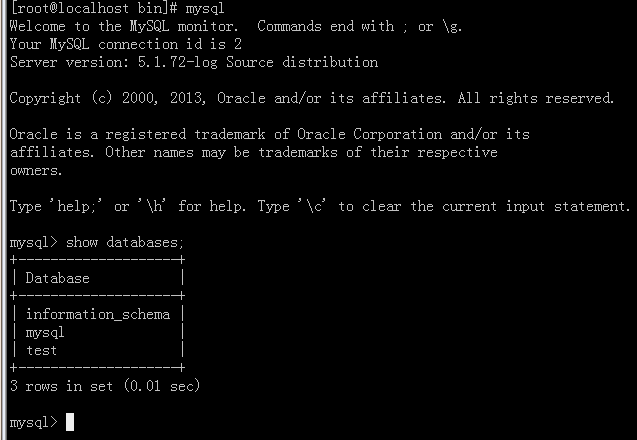采取编译安装的方法,其好处为:编译安装与平台无关,安装的MySQL目录独立,维护起来方便,而且拥有更好的性能。
环境:CentOS release 6.9 (Final) x86_64
1)下载mysql 链接:http://mirrors.sohu.com/mysql/MySQL-5.1/mysql-5.1.72.tar.gz 安装基础环境: yum -y install gcc gcc-c++ zlib-devel libtool ncurses-devel libxml2-devel wget 首先添加mysql用户及组 groupadd mysql useradd -g mysql mysql 编译安装: cd /usr/local/src wget http://mirrors.sohu.com/mysql/MySQL-5.1/mysql-5.1.72.tar.gz tar xf mysql-5.1.72.tar.gz cd mysql-5.1.72 ./configure --prefix=/usr/local/mysql --with-charset=utf8 --with-extra-charsets=all --enable-thread-safe-client --enable-assembler --with-readline --with-big-tables --with-plugins=all --with-mysqld-ldflags=-all-static --with-client-ldflags=-all-static make && make install 2)配置权限,数据安装路径为/data/mysql并设置开机自启动: cd /usr/local/mysql/ cp /usr/local/mysql/share/mysql/my-huge.cnf /etc/my.cnf cp /usr/local/mysql/share/mysql/mysql.server /etc/init.d/mysqld chmod +x /etc/init.d/mysqld chown -R mysql:mysql /usr/local/mysql/ mkdir -p /data/mysql //数据存放路径 sed -i '39a datadir=/data/mysql' /etc/my.cnf //加入配置文件 /usr/local/mysql/bin/mysql_install_db --user=mysql --datadir=/data/mysql //初始化文件和数据库 启动时遇到错误: [root@localhost mysql]# service mysqld start Starting MySQL. ERROR! Manager of pid-file quit without updating file. 解决方法:http://www.jb51.net/article/48625.htm 问题解决后: service mysqld start chkconfig mysqld on 配置环境: echo 'export PATH=/usr/local/mysql/bin:$PATH'>>/etc/profile source /etc/profile 对数据库简单优化: mysql> select user,host from mysql.user; mysql> delete from mysql.user where host='::1' mysql> delete from mysql.user where host='localhost.localdomain'; mysql> drop database test; 设置数据库密码: mysqladmin -u root password '123' 登录方式: mysql -uroot -p123 修改密码: mysqladmin -uroot -p123 password '111' 2)mysql配置文件优化 配置文件如下: [client] port = 3306 socket = /tmp/mysql.sock [mysqld] //mysqld服务启动时的参数 port = 3306 //端口号 socket = /tmp/mysql.sock //用户在linux环境下客户端连接可以不通过TCP/IP网络 skip-locking key_buffer_size = 384M //索引的缓冲区大小可设置为256M或384M,不建议设置过大 max_allowed_packet = 4M //消息传输量的最大值,默认1M最大1G,必须为1024的倍数 table_open_cache = 512 //高速缓存大小 sort_buffer_size = 2M //查询排序时使用的缓冲区大小 read_buffer_size = 2M //读查询操作使用的缓冲区大小 read_rnd_buffer_size = 8M myisam_sort_buffer_size = 64M thread_cache_size = 8 //连接线程最大数值 0~16384、1GB内存可以配置为8,2GB内存可以配置为16,3GB内存可以配置为32,4GB及以上64 query_cache_size = 32M //mysql查询缓冲区大小 thread_concurrency = 8 datadir=/data/mysql log-bin=mysql-bin server-id = 1 max_connections = 456 //允许的最大连接进程数 [mysqldump] quick max_allowed_packet = 16M [mysql] no-auto-rehash [myisamchk] key_buffer_size = 256M sort_buffer_size = 256M read_buffer = 2M write_buffer = 2M [mysqlhotcopy] interactive-timeout
做别名方便启动mysql:
alias mysql='/usr/local/mysql/bin/mysql'

2)优化
查看运行各种状态值: mysql> show global status; 1、慢查询 慢查询是指超过指定时间的SQL语句查询,分析MySQL语句查询性能的方法除了使用EXPLAIN输出执行计划,还可以让MySQL记录下查询超过指定时间的语句。 mysql> show variables like '%slow%'; 开启慢查询: mysql>set global slow_query_log=ON; 如果是主从结构,可以打开一台从服务器的慢查询来监控,或者用自带的命令查询 [root@localhost bin]# ./mysqldumpslow -s -c -t 20 /data/mysql/localhost-slow.log 2、连接数 遇见“MySQL:ERROR 1040:Too manyconnections”的情况配置文件中max_connections的值过小。 mysql> show variables like 'max_connections'; 查看过去最大连接数如果达到上限需要增大: mysql> show global status like 'Max_used_connections'; 3、key_buffer_size key_buffer_size是设置MyISAM表索引引擎缓存空间的大小 mysql> show variables like 'key_buffer_size'; 4、临时表 mysql>show global status like 'created_tmp%'; 5、open table的情况 open_tables表示打开表的数量,opened_tables表示打开过的表数量 mysql>show global status like 'open%tables%'; +---------------+-------+ | Variable_name | Value | +---------------+-------+ | Open_tables | 9 | | Opened_tables | 15 | +---------------+-------+ 6、进程使用情况 threads_created表示创建过的线程数 mysql>show global status like 'Thread%'; threads_created的值过大,表明MySQL服务器一直在创建线程,这也是比较耗资源的,可以适当增大配置文件中thread_cache_size的值。 mysql>show variables like 'thread_cache_size'; 7、查询缓存 query_cache_size用于设置MySQL的查询缓存(query cache)大小,query_cache_type用于设置使用查询缓存的类型 8、排序使用情况 mysql>show global status like 'sort%'; 9、文件打开数 文件打开数(open_files)大于open_files_limit值时,MySQL数据库就会产生卡住的现象。 mysql>show global status like 'open_files'; mysql>show variables like 'open_files_limit'; 10、Innodb_buffer_pool_size的合理设置
平台配置:
[client] default-character-set=utf8 port =3306 socket =/tmp/mysql.sock [mysqld] user =mysql port =3306 socket =/tmp/mysql.sock basedir =/usr/local/mysql datadir =/data/mysql/data log-error =/data/mysql/mysql-error.log pid-file =/data/mysql/mysql.pid old-passwords =1 log_slave_updates=1 log-bin =/data/mysql/binlog/mysql-bin binlog_format =mixed binlog_cache_size =4M max_binlog_cache_size=8M max_binlog_size =1G expire_logs_days =90 binlog-ignore-db =mysql binlog-ignore-db =test binlog-ignore-db =information_schema key_buffer_size =384M sort_buffer_size =2M read_buffer_size =2M read_rnd_buffer_size =16M join_buffer_size =2M thread_cache_size =8 query_cache_size =32M query_cache_limit =2M query_cache_min_res_unit=2k thread_concurrency =32 table_cache =614 table_open_cache =512 open_files_limit =10240 back_log =600 max_connections =5000 max_connect_errors=6000 external-locking =FALSE max_allowed_packet =16M default-storage-engine =MyISAM thread_stack =192K transaction_isolation =READ-COMMITTED tmp_table_size =256M max_heap_table_size =512M bulk_insert_buffer_size =64M myisam_sort_buffer_size =64M myisam_max_sort_file_size=10G myisam_repair_threads =1 myisam_recover long_query_time =2 slow_query_log slow_query_log_file =/data/mysql/slow.log skip-name-resolve skip-locking skip-networking innodb_additional_mem_pool_size = 16M innodb_buffer_pool_size = 512M innodb_data_file_path = ibdata1:256M:autoextend innodb_file_io_threads = 4 innodb_thread_concurrency = 8 innodb_flush_log_at_trx_commit = 2 innodb_log_buffer_size = 16M innodb_log_file_size = 128M innodb_log_files_in_group = 3 innodb_max_dirty_pages_pct = 90 innodb_lock_wait_timeout = 120 innodb_file_per_table = 0 [mysqldump] quick max_allowed_packet = 64M [mysql] no-auto-rehash Remove the next comment character if you are not familiar with SQL safe-updates [myisamchk] key_buffer_size = 256M sort_buffer_size = 256M read_buffer = 2M write_buffer = 2M [mysqlhotcopy] interactive-timeout